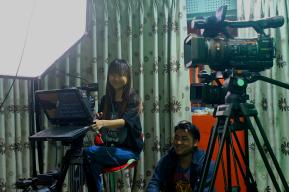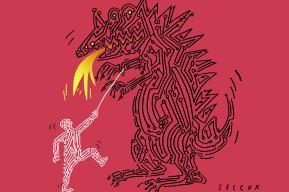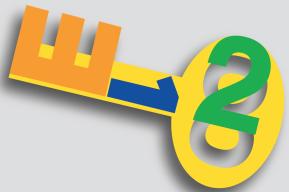Idea
Dan Meyer: “Maths has an obvious perception problem among students”

Interview by Linda Klaassen
UNESCO
What sparked your interest in maths?
I’ve always been interested in school and maths. I’ve myself had a series of disappointing and frustrating experiences with mathematics that I hold on to, to give me empathy towards those who feel that way. But I’ve also benefited from some exceptional teachers who emphasized the value of my own ideas, even if they had seen those ideas many times in the past. As part of their work, they made an effort to be curious about students.
I also had some powerful experiences using mathematics to accomplish particular goals and to answer questions I had. It was not just something I did for a mark in school or to pass a credential, I was curious which grocery line at the supermarket was the fastest – is it the express lane with lots of people who have few items? Or is it the other line that has fewer people with lots of items? It’s a very powerful experience to take a question that everyone wonders when they go shopping at the market, and to use mathematics to help answer it.
Why are so many students “traumatized” by this discipline?
If you look on Google, ‘Why am I so bad at mathematics?’ has multiple amounts of searches compared to the same question about subjects like language, science or history. Maths has an obvious perception problem among students. Culture plays a role and home plays a role, but teachers have a lot of influence there.
Students come to regard maths class as a kind of unreality, a place where they need to suspend their sense of themselves
In other subjects, there is often an effort to determine what it is that students already know. In mathematics, we often assume that students come in knowing very little, until we tell them things. Success in mathematics often requires that they alienate themselves from the knowledge they have about numbers, shapes, patterns – and about how the world works – for the sake of some canonical knowledge. We shouldn’t be giving students word problems where someone will run ten miles at a constant rate, when they know that people don’t run ten miles at a constant rate. This happens all the time, and makes students come to regard maths class as a kind of unreality, a place where they need to suspend their sense of themselves and their world in order to be successful.
The perception is often that either you’re a maths person, or you’re not. In the humanities, truth is often decided by a community consensus, where experts and non-specialists alike can express their opinions. In maths class, you're trying to please long-dead historians who created the mathematical canon. That can be an alienating experience. I don’t know if I want to, every day for twelve years of my life, come to a class and try to make dead people happy with me.
How should maths be taught to make it attractive to students?
We need to make an effort to give students experiences that awaken their senses and bring to the surface the valuable knowledge they have. It’s important that students feel interested in, and see the value of, the activities we ask them to do for twelve years of the only childhood they have, full stop. Often, students leave their experience in mathematics feeling worse about themselves as humans, feeling less capable, and less valuable, than they did before they started their maths education. That’s a shame. That’s why we should focus a lot of energy on how we teach mathematics.
At the moment, I spend much of my time trying to figure out how we do justice to the incredible value of the human lives that teachers get to be a part of for a brief moment. If students don’t feel loved by their environment, this should motivate us to consider changes.
How can teachers be encouraged to change their practice?
Teachers are absolutely essential. While I have a lot of criticisms for how educators operate with maths students, I also have enormous respect for that work. Right now I work in education technology, and one thing teachers can do better than technology is to offer students experiences in a way that inspires them to share the contents of their brain, to share their knowledge about mathematics. For instance, putting on the board several similar but different shapes, and asking them: ‘What’s the same or different about these shapes? Which one doesn’t belong?’ The teacher creates an environment of safety where students offer their ideas. That is the process by which people learn, and love learning, anything.
Being a teacher is extremely demanding: not only do you have to be a qualified expert in your field, but also a sociologist and a therapist
When I was a teacher, I spent a lot of time modifying and creating curricula. Effective curriculum is an area in which teachers need a lot of support. Most curricula on the market say: ‘We don’t care what you know, students. Here’s what we know. We’ll tell it to you and then you repeat it back to us’. We need to support teachers with pedagogies that go beyond this. We need to help teachers know when not to talk, how to listen effectively, how to connect different ideas together. It’s such a huge job. Anyone who has taught is well aware of the complexity of the work, how it requires you to be a sociologist, a therapist, an academic, all these different things at the same time. It’s a real challenge. There’s lots of room for support here.
What will the mathematics textbook of the future look like?
The textbook of the future needs to make abundant room for developing student ideas – as much room as it provides for the ideas of the past, which are also important. This curriculum needs to ask itself on every page: ’Why did we invent this new mathematics, and what problem was this meant to solve? Why couldn’t we just stick with the older mathematics?’ The textbook of the future needs to say: ’Why do we need this mathematics?’, and help students encounter that need. We need to do justice to very real needs that humans have in their learning process.
Dan Meyer
Previously a high school mathematics teacher, Dan Meyer holds a Ph.D. degree in mathematics education from Stanford University (United States). He is currently a Director of Research at Desmos, a company developing free maths software tools and programs for educators around the world.

In the same issue










